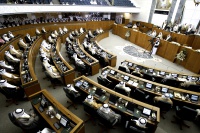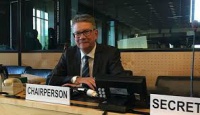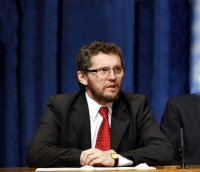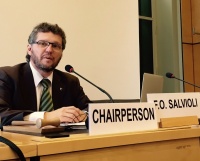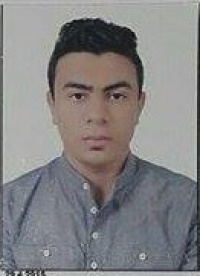Kuwait: DNA Collection Law to be Amended to Limit its Scope to Criminal Suspects Only
On 19 October 2016, the Speaker of Kuwait's National Assembly, Marzouq Al-Ghanim, disclosed information according to which the Emir of Kuwait agreed to put Law No. 78/2015 on compulsory DNA collection, in line with the Kuwaiti Constitution in order to respect the right to privacy. The Emir requested the Parliament to reconsider the scope of the law with the view of imposing compulsory DNA collection to criminal suspects only, instead of all Kuwaiti citizens and residents as it was initially envisioned. Alkarama welcomes the decision of the Emir, which reflects the recommendations made in its report to the Human Rights Committee (HRCtee) during the third periodic review of the situation of human rights in Kuwait, held on 15 July 2016.
Kuwait: UN Committee Against Torture Issues its Conclusion After Country’s Review
On 12 August 2016, the Committee against Torture (CAT) published its concluding observations on the third periodic review of Kuwait held during its 58thsession from 25 July to 12 August. The Committee's experts assessed the implementation of the Convention against Torture and Other Cruel, Inhuman or Degrading Treatment or Punishment (UNCAT), ratified by Kuwait in 1996, on the basis of information provided by both NGOs, including Alkarama's report, as well as the State party in its national report.
Kuwait: Committee against Torture 2016 - Alkarama's Alternative Report in view of the 3rd Periodic Review
Kuwait: Alkarama Submits Shadow Report to Human Rights Committee Ahead of the Country’s Review
On 27 May 2016, Alkarama submitted its shadow report to the UN Human Rights Committee (HRCtee) on the situation of civil and political rights in view of Kuwait's third periodic review which will take place on 21 and 22 June 2016. During the session, the Committee's experts will assess the implementation of the International Convention on Civil and Political Rights (ICCPR), ratified in 1996, on the basis of information from NGOs, including Alkarama, and from the State provided in its national report.
Kuwait: Human Rights Committee 2016 - Alkarama's Shadow Report - 3rd Periodic Review
Kuwait: Stateless person prevented from attending university abroad
 Ahmad Ali Matar Jaber, 32, is a stateless person, or “bedoon”, who was born in Kuwait. He pursued a career as a linguist and in 2015, received proposals from renowned universities to continue his academic life abroad. He was offered a scholarship attached to a teaching assistant position in the West Virginia University, a seat at the University of Edinburgh, United Kingdom, and was accepted for a postgraduate degree at Trinity College, Dublin, Ireland. After deciding to accept one of these offers, Ahmad left his job in Kuwait.
Ahmad Ali Matar Jaber, 32, is a stateless person, or “bedoon”, who was born in Kuwait. He pursued a career as a linguist and in 2015, received proposals from renowned universities to continue his academic life abroad. He was offered a scholarship attached to a teaching assistant position in the West Virginia University, a seat at the University of Edinburgh, United Kingdom, and was accepted for a postgraduate degree at Trinity College, Dublin, Ireland. After deciding to accept one of these offers, Ahmad left his job in Kuwait.
Kuwait: UN Human Rights Committee Raises 27 Questions with Kuwaiti Authorities Ahead of Review in July
As a State Party to the International Covenant on Civil and Political Rights (ICCPR), Kuwait will be reviewed by the Human rights Committee (HRCtee) during its third review in July this year. The HRCtee, a monitoring body of 18 independent experts, will discuss the country's implementation of the rights enshrined in the ICCPR. In this regard, the HRCtee adopted, on 4 December 2015, a list of 27 issues to be discussed during the review. Among the main concerns raised is compulsory DNA collection, the death penalty and the practice of torture, discrimination against Stateless persons known as the Beduns, the lack of independence of the judiciary and the violent crackdown on peaceful gatherings severely restricting the right to freedom of speech and assembly.
Kuwait: New Cyber Crime Law Disrespects Freedom of Expression
On 12 January 2016, Kuwait's new Cyber Crime Law no. 63, which contains provisions that severely restrict freedom of expression on the internet, came into force. Several human rights NGOs criticised this law, as its broad definitions can be used to punish peaceful opposition and dissenting voices. In a State where fundamental rights and freedoms are extremely restricted, the enactment of such law is particularly concerning. Alkarama, therefore, denounced this law to the United Nations Special Rapporteur on the promotion and protection of the right to Freedom of Opinion and Expression (SR FRDX), David Kaye, on 27 January 2016, asking him to call upon the Kuwaiti authorities to repeal it.
Kuwait: Student Extradited to Egypt at Risk of Torture and Trial by Military Tribunal
On 19 November 2015, Alkarama sent two communications, one to the United Nations Special Rapporteur on Torture and other cruel, inhuman or degrading treatment or punishment (SRT) and one to the UN Working Group on Enforced Disappearances (WGEID), regarding the case of 20-year-old Egyptian student Omar Abdulrahman Ahmed Youssef Mabrouk, who was extradited to Egypt, where he is at high risk of torture and trial by a military tribunal, on 2 November 2015. Before Omar's extradition, Alkarama had sent an urgent appeal to the SRT, requesting him to urge Kuwaiti authorities to reject Egypt's request for extradition and to release him immediately.
Kuwait: Student at High Risk of Torture if Extradited to Egypt
On 23 October 2015, Alkarama sent an urgent appeal to the United Nations Special Rapporteur on Torture and other cruel, inhuman or degrading treatment or punishment (SRT) regarding the case of 20-year-old Egyptian student Omar Abdulrahman Ahmed Youssef Mabrouk, who disappeared after his arrest by State Security forces in Kuwait City in early October 2015.
 Algeria
Algeria Bahrain
Bahrain Djibouti
Djibouti Egypt
Egypt Iraq
Iraq Palestine/Israel
Palestine/Israel Jordan
Jordan Kuwait
Kuwait Lebanon
Lebanon Libya
Libya Mauritania
Mauritania Morocco
Morocco Oman
Oman Qatar
Qatar Saudi Arabia
Saudi Arabia Sudan
Sudan Syria
Syria Tunisia
Tunisia United Arab Emirates
United Arab Emirates Yemen
Yemen Other Countries
Other Countries

